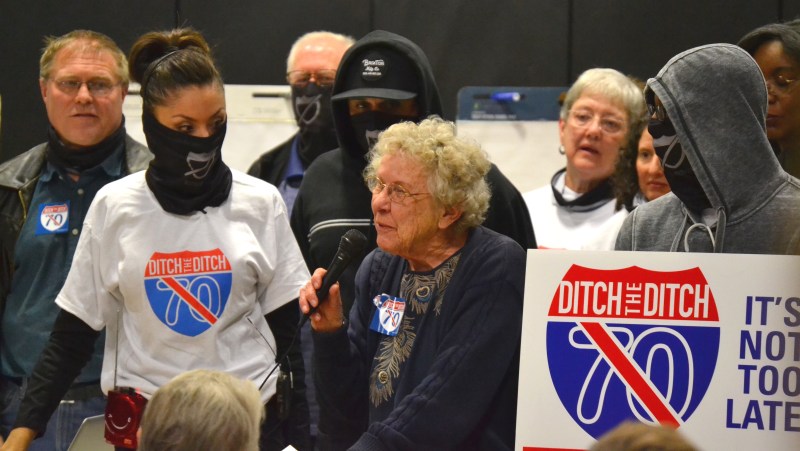Denver Post Regurgitates Colorado DOT’s Talking Points on I-70

The Denver Post editorial board might as well be a mouthpiece for the Colorado Department of Transportation. Like an extension of the CDOT PR team, the paper is playing defense for the agency as it battles a new round of legal action against its I-70 widening project.
On Tuesday the Post published a piece, “Ditch the delay on Interstate 70 expansion,” that regurgitated the agency’s well-polished talking points about widening the highway through Globeville, Elyria, and Swansea.
To have the Post tell it, widening an interstate through city neighborhoods is actually a community connector, a jobs program, an affordable housing solution, an investment in our children, and a boon for outdoor recreation. That must be why so many cities are solving their problems these days by spending billions of dollars on traffic-generating, sprawl-inducing highway expansion projects.
Before the Post gets into — no joke — “the right way to take 56 homes and to saddle a community with years of construction and an expanded interstate,” the writers give advocates a condescending pat on the head, declaring they “should be applauded for their diligence and good work.”
What follows could have been written by CDOT. Let’s break the editorial down:
Fortunately, the Colorado Department of Transportation is doing things right as it prepares to expand Interstate 70 and drop it below grade so a cap can reunite communities and become a school playground and park.
If “reunite communities” sounds familiar, that’s because the CDOT communications office has used some form of that phrase for years. In 2015, the agency said the cap would be “reuniting and protecting the neighborhoods.” The year before, an agency press release said the project would “stitch together nearby communities” and “reunite Denver neighborhoods.”
But the cap is just a small part of the project. As a whole, the new I-70 trench would have fewer pedestrian connections than neighborhoods have now under the viaduct, and tripling the footprint of the highway means longer crossings.
Here’s more from the Post:
Plaintiffs question whether CDOT’s engineers adequately accounted for the water that will flow through this floodplain on a project that puts a major interstate below grade. Fair question, but we are satisfied by CDOT’s response that the project’s stormwater system is designed to handle big storms on its own and is not dependent on the city’s near-simultaneous plans to address stormwater issues in the same area.
This obscures what’s really going on. The lawsuit seeks to demonstrate that CDOT misrepresented the scope of the project, because flood control work the city agreed to help pay for is inextricably linked to the I-70 widening — and yet that aspect of the project was not included in CDOT’s environmental review.
Unlike the opinion page, the Post’s newsroom has done good independent reporting on this issue. The paper’s own reporting showed the connections between the I-70 ditch and the flood mitigation work that CDOT claims is unrelated.
But CDOT’s word is good enough for the editorial board. Good thing the answer is up to the courts, not the Post.
The writers go on to praise CDOT for reimbursing residents forced to uproot their lives (it’s the law), contributing $2 million to an unidentified affordable housing initiative, providing windows and air conditioning units to mitigate pollution seeping into homes during construction, and, finally, launching a workforce training center to help meet requirements that 20 percent of I-70 workers are local residents.
These are not high bars to clear. They’re standard operating procedure for a highway agency looking to tamp down resistance to an unpopular project.
In 2017, cities around the country are tearing down highways because of the scars they cut through urban neighborhoods. With the I-70 widening, CDOT is moving in the opposite direction and dragging the city backward. And that’s just fine with the Denver Post.


